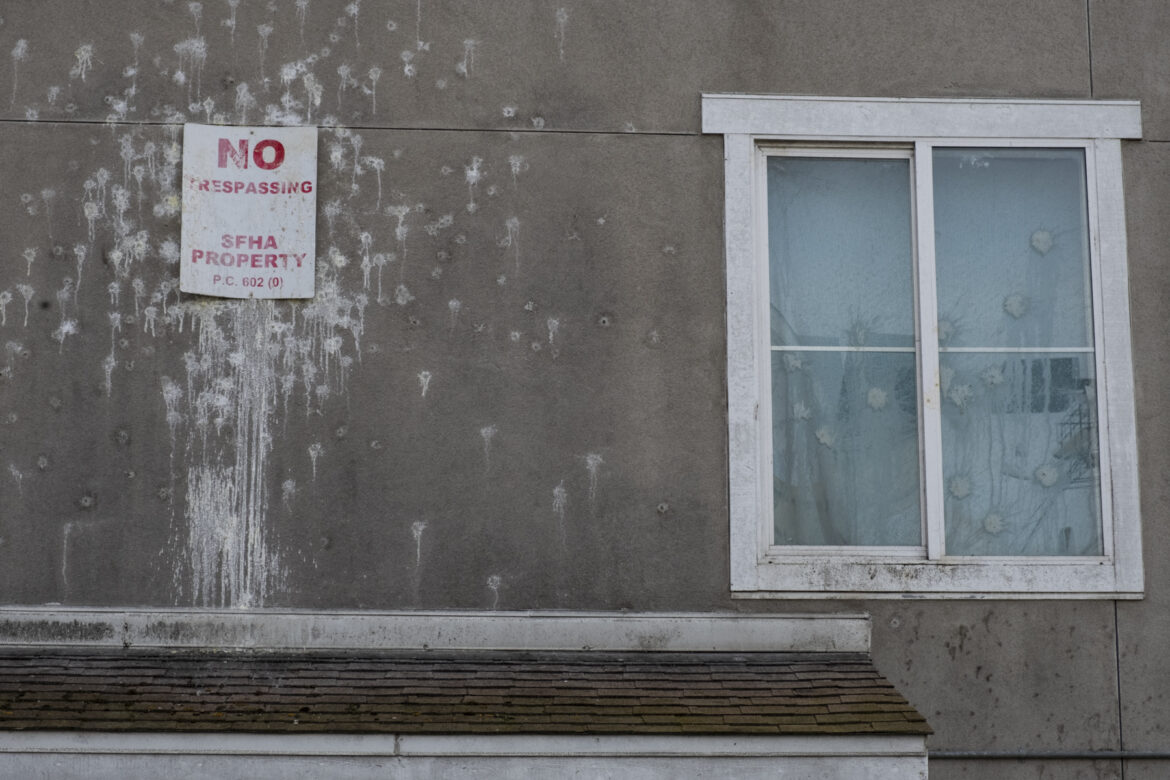Tenants living a mere 15-minute walk from the political heart of one of the richest cities in the world have been trying to raise attention about the dilapidated conditions they have experienced at San Francisco’s Plaza East public housing complex for at least a decade.
The city finally responded in April with $2.7 million in funding for repairs to moldy, flooded, pest-infested apartments.
But as repairs continue, albeit with mixed results, they do little to answer a question raised by local officials, public housing experts and tenant advocates: How did the development, built just two decades ago, fall into this level of disrepair in such a short time?
“Where’s the city been? Where’s the Housing Authority been? Where’s HUD been? Where has the property manager been?” said Deborah Thorpe, deputy director of the National Housing Law Project, referring to the San Francisco Housing Authority, the U.S. Department of Housing and Urban Development, and developer McCormack Baron Salazar, which built the complex and managed it until June 2021. “Especially in a city like San Francisco, with so many resources, it is such a shame to see tenants living in this condition.”
Nobody involved in the project has been able to explain how things got so bad at Plaza East, but there’s plenty of blame to go around. Interviews, lawsuits and public records including dozens of complaints and violation notices suggest the decay results from a combination of brick-and-mortar issues, managerial neglect and failure of oversight by the Housing Authority, which has its own troubled history and was taken over by the city in 2018.
The effects on the low-income tenants — many of whom are people of color, immigrants or disabled — can be severe, and goes beyond the toll on their physical health from respiratory disease or other damage from allergens or mold, said Carlos Martín, director of the Remodeling Futures Program at Harvard’s Joint Center for Housing Studies.
“It’s also the mental health challenges of being in a constant state of trauma,” he said. “That’s worrisome for all people who live in any kind of inappropriate and inadequate and severely distressed housing.”
How the rot got started
As one of 266 properties revitalized under a HUD program known as HOPE VI that renovated severely distressed public housing developments into mixed-income complexes, Plaza East was the first such project to apply for demolition when it submitted its request earlier this year. It also stood apart from other sites in the program in having all its 193 units designated as public housing, said Susan Popkin, director of the Housing Opportunities and Services Together Initiative at the Urban Institute, a policy think tank.
The lack of rental income from units with higher-paying tenants, which can be used to address needed repairs, “might have been a factor that put Plaza East particularly at risk,” she said.
Still, developers are supposed to build new public housing to HUD’s 20-year viability standard that requires buildings to remain structurally sound for at least that time period, Popkin said. “They usually build in some kind of escrow or some kind of plan for how that’s going to happen.”
Plaza East developer McCormack Baron Salazar has on multiple occasions ascribed the lack of maintenance at Plaza East to the government’s historical underfunding of public housing. As of 2019, the nation’s public housing stock was experiencing a $70 billion backlog in funding for capital needs like maintenance and repairs, the National Low Income Housing Coalition reported. HUD’s Operating Fund for asset management has been “massively underfunded” since President Ronald Reagan was in office in the 1980s, Martín said.
However, it’s unclear whether limited funding can explain other alleged failures of the development’s management. Lawsuits and tenant complaints filed against McCormack Baron Salazar indicate a history of the company failing to address residents’ needs in a timely manner or ignoring them, forcing tenants to remain in dilapidated units for weeks or months at a time.
“I come in at five o’clock in the evening, to come tell you for the millionth time about the repair that you should have written down f– 20 times,” said Danita Flores, who is a part of an ongoing lawsuit against McCormack Baron Salazar, echoing complaints made by numerous tenants. “I get tired being a broken record.”
Five lawsuits against the company since 2011 describe habitability issues, and several allege a lack of urgency when it comes to addressing problems. Some claim harassment by staff.
Regarding allegations in the ongoing litigation, “at this time, the appropriate and responsible place to address them will be through that process; one which we expect will reflect a full and accurate assessment of the history and facts involved,” Adhi Nagraj, McCormack Baron Salazar’s senior vice president, wrote in an email. “For now, our priority and focus is to continue the ongoing improvements and work needed to meet the residents [sic] immediate as well as future needs, in coordination and with the support of the resident council, the residents, and local authorities.”
However, even with funding from the city, emergency repairs overseen by the company alongside the Mayor’s Office of Housing and Community Development are behind schedule. Repairs are meant to temporarily address sewage problems, among other in-unit issues, some of which have been documented for years.
Troubled plumbing
Sewage problems at Plaza East appeared early and did not let up with time.
In 2006, an SFGATE article quoted tenant Jannie Starks talking about struggles with plumbing in her unit. The piece cites her discussing “a repeating sewage overflow problem that she blames on shoddy construction and the city blames on old pipes outside and under the building.”
The earliest Department of Building Inspection records of tenant complaints and building violations regarding sewage floods at Plaza East go back to 2012, with an uptick in sewage, mold and pest problems beginning in 2016.
Twenty-three complaints regarding plumbing, encompassing everything from flooding, leaks and water damage to issues with garbage disposals and washing machines, have been recorded since the buildings’ opening in 2001.
“There’s a clear water problem that’s going on,” Martín said. He suspects the main sewage lines connecting to the apartments are partly to blame, and city records provide some support for that suggestion. Permits show that sewer repairs and replacement occurred in 2019 and 2020. Discussing the demolition application, Nagraj previously said “rehabilitation alone would not address structural problems, including an undersized sewer system.”
Another culprit could be faulty fire alarm systems that trigger sprinklers, he said. The sprinklers in one family’s unit went off when they should not have in May, which Ahmad Alaydi said flooded the apartment with more than a foot of water, destroying many of his family’s possessions. A 2018 building permit was granted to replace defunct fire alarms across three Plaza East buildings that didn’t communicate with each other. Additional money from the emergency repairs loan was set aside to upgrade fire alarms in every unit.
“My guess is that there probably is deep decay at, unfortunately, just slightly more than the rate of a lot of other public housing,” Martín said.
One particularly revealing inspection of several units in January 2016 gives a hint of the massive scope of problems at Plaza East. Notices of violation for the inspections that day revealed myriad issues, including at least five units with bedbugs, three with cockroaches and 13 with mice infestation. Inspector notes state that “the building has a serious bed bug issue” and there was “evidence of roach infestation in an entire building.” Other problems mentioned by inspectors included lead paint, sinking floors, dry rot in stairs, broken windows, leaky sinks and other fixtures in varying states of disrepair.
“It’s horrible living in these conditions,” said resident Rockesha Norris, who said when her toilet flooded her “entire downstairs” four years ago, she was threatened with eviction two days later for not having a clean unit. Nowadays, leaks in her unit cause floods in her kitchen and daughter’s bedroom every time it rains, she said.
The contract between McCormack Baron Salazar and the San Francisco Housing Authority from 2002 — the only such document the city produced in response to a public records request — notes that emergency repairs should be received and serviced within a 24-hour period, and that all units should be inspected at least annually.
However, though tenants have often been vocal with the city and with management about the substandard conditions of buildings, action is not always taken. Twenty-one Plaza East complaints remain active at the time of publication, as do 40 building inspection violations. The city has issued 90 notices of violation at the property, including 21 for plumbing and electrical issues, 10 for fire violations and six for sanitation problems. It also noted at least four pest and two mold violations.
If complaints don’t meet standards required for a violation — a frequent problem with mold, the subject of 19 tenant complaints — there is little the city can do.
Though a tenant may have mold in their unit, it must measure two feet by two feet and be visible to the naked eye to be considered a violation. If the mold is smaller than that or is in the walls or under the carpet — which happens often, said Roberto Arevalo, an environmental health inspector at the Department of Public Health — the city cannot cite the property manager. If it doesn’t meet requirements, “you can clean it up yourself or you can let it grow,” Arevalo said.
Who’s responsible?
A 58-page lease from 2019 indicates McCormack Baron Salazar may be attempting to shift liability for some of the more egregious safety hazards onto residents through mold and pest addendums by requiring tenants to alert management to these issues within 48 hours. Failure to do so means tenants may be held liable for ensuing damages. It is unclear whether they were present from the complex’s opening days, and how they would hold up in court. McCormack Baron Salazar did not answer questions about when or why these addendums were introduced.
“These types of addendums to leases are increasingly common for institutional landlords,” Joshua Ezrin, an attorney representing several Plaza East tenants in an ongoing lawsuit against McCormack Baron Salazar, wrote in an email. “However, they do not eliminate the landlords’ non-delegable duty to make repairs and provide habitable housing.”
The Plaza East management contract details the developer’s record-keeping and reporting obligations. It is required to submit monthly, quarterly and annual reports regarding the state of units, maintenance requests, vacancies and rent collection, among other things. Presumably, these reports would allow the Housing Authority to monitor the state of the complex, track reported issues at Plaza East and ensure McCormack Baron Salazar was fulfilling its obligations to tenants. However, it is unclear if the developer has been submitting those reports and if not, whether the Housing Authority was pressing the developer to do so, as both McCormack Baron Salazar and the Housing Authority did not respond to questions about the reports.
“There’s no confusion about who is responsible for making those repairs, so you have to question, why are they not getting done?” said Thorpe of the National Housing Law Project, pointing to the Housing Authority and the private management company. “That can be really frustrating for tenants, and really dangerous in some cases.”
Popkin points to the Housing Authority. “There wasn’t a lot of oversight and sufficient oversight and that contributed to the problems,” she said.
The Housing Authority’s role
The San Francisco Housing Authority has a turbulent history, having been taken over by HUD several times and by the city in 2018.
“San Francisco was one of the worst managed housing authorities in the country for a long time,” Popkin said. “That is part of the problem here. It isn’t just this development that the Housing Authority of San Francisco is having trouble with.”
In the Public Housing Assessment System, which examines financial, managerial and physical subsystems, as well as how quickly the housing authority delegates money from its capital fund, the San Francisco Housing Authority has consistently fallen short.
| Fiscal Year | Overall Score / 100 | Audit | Status |
| 2012 | 54 | Yes | Troubled |
| 2013 | 49 | No | Troubled |
| 2014 | 57 | Yes | Troubled |
| 2015 | 51 | Yes | Troubled |
| 2016 | 70 | No | Standard |
Public housing authorities that score less than 60 points are labeled “troubled,” a status San Francisco’s agency achieved every year from 2012 to 2015.
The agency was one of 13 housing authorities that remained “troubled” longer than the one-to-two-year period allowed for recovery after it was found in substantial default of its annual contracts with HUD, the department noted in a memorandum from February 2020. By law, when a housing authority does not improve its status to standard in this time frame, HUD is required to petition for an administrative receiver to take over the authority, or to take over itself. The required takeover, which put the Mayor’s Office of Housing and Community Development in charge, occurred in 2018.
Though the Housing Authority is no longer considered “troubled” under HUD guidelines, the living conditions of individuals at Plaza East suggest otherwise.
Many tenants at other public housing complexes in San Francisco such as Potrero Hill and Sunnydale have also detailed problems with the Housing Authority (such as poor record-keeping, lack of transparency and communication with residents and allowing residents to live in squalor) in a series of protests against the conversion of their complexes into Rental Assistance Demonstration properties. This process entails demolition of older buildings and new construction under public-private partnerships.
The Housing Authority did not provide comment regarding recent protests or its role in overseeing McCormack Baron Salazar and Plaza East.
“I don’t know why there’s been such consistently poor management of the Housing Authority in San Francisco,” Popkin said. “A lack of civic engagement also often contributes to that if it’s not part of what the rest of the city is paying attention to.”
She noted that many other housing authorities that HUD’s California office oversees are fine. “It could be that it was such a low priority in such an expensive rental market housing market.”
“The U.S. Department of Housing and Urban Development (HUD) continues to prioritize its partnerships with the state’s housing authorities and local stakeholders,” a regional spokesperson for HUD wrote in an email. “The Department is aware of the concerns regarding housing conditions at Plaza East, and is working diligently with the San Francisco Housing Authority, residents, city officials, and other vested parties to develop future plans for this community while concurrently addressing maintenance issues (etc.) as the planning process moves forward.”
“The years of neglect and poor conditions were allowed to persist because the city government, in many ways, has accepted substandard living conditions in public housing,” said Dean Preston, the city supervisor for District 5, where Plaza East is located. “It’s everything from federal disinvestment in public housing on down to the local level, and mismanagement of the Housing Authority. But really, at its root, it is the devaluing of the health and safety and lives of people in public housing.”
Support for this story was provided by the Fund for Investigative Journalism.Thanks also to the Investigative Editing Corps, which helped launch this series, “Public Housing in Private Hands,” in 2020.










